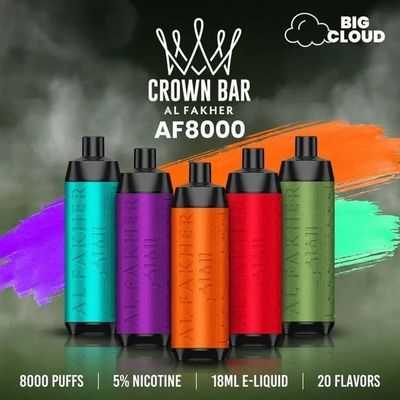Organic Vape: 2025 Natural Ingredients Really Healthier? A Must-Read Guide for Consumers
Today, with health awareness on the rise, when the “organic vape” label appears on vape products, claiming to use natural plant extracts, no pesticide residues, and no artificial additives, many consumers who pursue a healthy lifestyle will inevitably be tempted. Organic vegetables and organic cotton products have been deeply rooted in people’s hearts, so do “organic vape” represent a safer and healthier choice? This article will explore the nature, advantages, controversies, and key points of purchasing organic e-cigarettes to help you make a wise decision.

Organic vape: Concept analysis and the core differences between traditional vape
The so-called “organic vape” usually refer to the key elements in their vape juice ingredients (mainly including propylene glycol PG, vegetable glycerin VG, nicotine, and flavors), especially vegetable glycerin and nicotine, which come from certified organic crops and follow specific organic standards during the production process to minimize the use of synthetic chemicals, pesticides, and fertilizers.
Core ingredient comparison:
- Vegetable glycerin (VG): Organic vapes emphasize the use of VG extracted from organic coconut oil, palm oil (pay attention to sustainability certification) or rapeseed oil. There is no such restriction on traditional VG sources.
- Nicotine: Organic versions may use nicotine extracted from organically grown tobacco (although nicotine itself is harmful) rather than synthetic nicotine. Traditional nicotine is widely available.
- Spices: Ideally, natural flavor extracts from organic plants should be used. In reality, it is difficult and expensive to formulate completely organicvape Traditional flavors are mostly synthetic or mixed.
- Propylene glycol (PG): Organic PG is extremely rare and expensive. Most organic vapesreduce the PG ratio or use non-organic but high-purity PG.
What the “Organic Vape” Label Really Means in the Vape Industry and the Challenges of Certification
It is necessary to be aware that “organic vape” currently lack a globally unified, mandatory authoritative certification standard, which is in stark contrast to the mature organic certification systems in the food and agricultural products sector (such as USDA Organic in the United States and EU Organic in the European Union).
Certification status:
- Ingredient certification: Some brands may only ensure that their VG or nicotine raw materials are certified organic (such as USDA Organic), but this does not mean that the entire vape juice or final product is certified.
- Self-claims: There are a large number of products on the market that rely solely on vague terms such as “natural” and “derived from plants” for marketing, and the “organicvape” label is sometimes abused.
- Emerging Standards: A few independent organizations or industry alliances are trying to establish organic standards specific to vape, but their impact is limited and not widespread.
Core challenges:
- Complexity of vape juice: Vape juice is a mixture of multiple ingredients. It is extremely difficult to ensure that every ingredient (especially flavors) is 100% organic and traceable.
- Production environment: Even if the raw materials are organic, there is a lack of unified supervision on how to prevent contamination and maintain organic integrity during the mixing, filling, and equipment production processes.
- Health paradox: The fundamental contradiction is that even if the ingredients are organic, heating and inhaling any substance into the lungs itself poses unknown risks. Organicvape does not mean harmless.

Claimed advantages: Analysis of the core selling points of organic vape
Despite the challenges, proponents and vendors point to the following potential benefits:
- Reduce intake of potentially harmful chemicals: Avoid breathing in residual pesticides and herbicides (which may be present in non-organically grown tobacco or VG raw material crops). Reduce the unknown risks that synthetic flavors may bring (especially some compounds such as diacetyl and acetyl propionyl ketone that may cause problems such as “popcorn lung”. Although mainstream brands have significantly reduced them, organic natural flavors can theoretically further avoid them).
- A purer taste experience:Advocates of organic and natural flavors believe that they can provide a more realistic and delicate flavor level, the taste may be smoother and more natural, and reduce the stimulation or “fake sweetness” caused by artificial flavors.
- Environmental sustainability considerations:Organic farming usually means paying more attention to soil health, biodiversity conservation and water resource management. Choosing vapes with organic raw materials, to some extent, supports more environmentally friendly agricultural production methods (paying attention to the sustainability of crops such as palm oil).
- Catering to specific consumer needs:For consumers who pursue a natural, organic lifestyle and are still looking for alternatives to smoking, organic vape provide a psychologically “better” option.

The emergence of “organic vape” reflects the market’s pursuit of purer products and more transparent production methods. It has a certain appeal in terms of reducing certain chemical residues and providing different taste experiences. However, the “organic vape” label does not mean safety or health. The addictiveness and harm of nicotine, as well as the potential risks of atomization inhalation itself, are the core issues that cannot be avoided. Coupled with the imperfections of the current certification system and the chaos in the market, consumers need to be highly vigilant.
When considering organic vape, be sure to position them as one of the potential tools for adult smokers to seek harm reduction, rather than a health and fashion consumer product. In-depth research on certification, strict review of ingredients, selection of reputable brands, and recognition of inherent risks are the keys to making responsible decisions. Ultimately, completely staying away from tobacco and nicotine dependence is the ultimate path to health.

